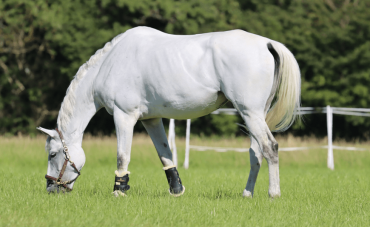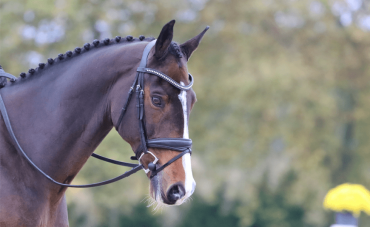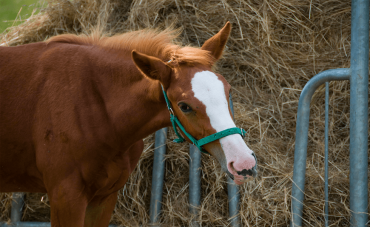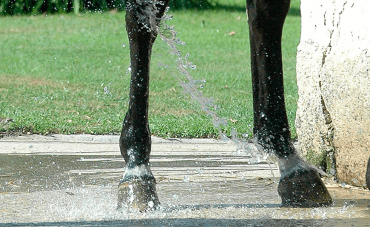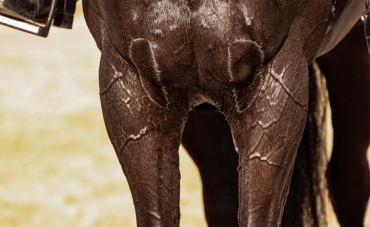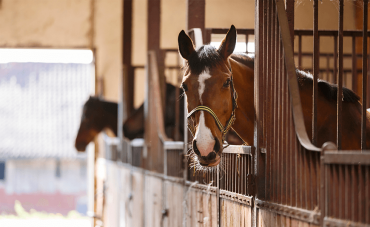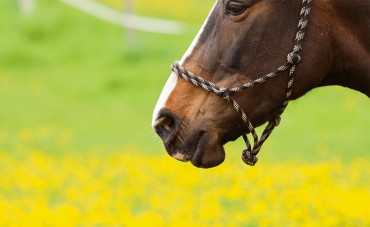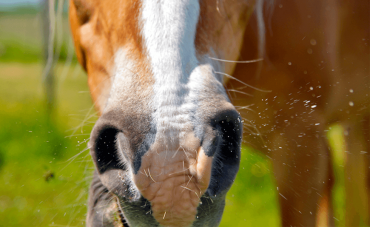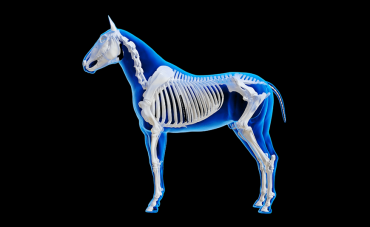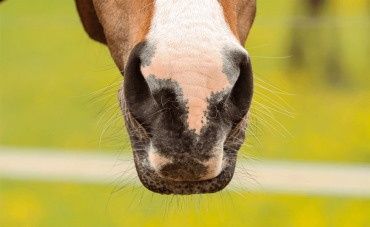If the term tying up doesn't ring any bell to you, you may be more familiar with terms such as tying up, Monday sickness or blood stroke. Let’s take a look at this condition that can disrupt your horse's life.
What is equine tying up?
Equine tying up is an inflammation of the muscles that usually occurs after physical effort and is related to the breakdown of muscle cells. It is often compared to cramps for humans, the difference being that these 'cramps' are usually extremely painful for the horse and are not limited to only one area.
While this condition is often described as occasional with attacks, some horses may have more recurrent and chronic forms.
Tying up can be a real hindrance to a horse's sporting career, because in addition to requiring rest after an attack (and therefore a period of convalescence it can lead to serious after-effects that can compromise the horse’s career.
Causes of tying up in horses
There are several causes that can lead to tying up, triggering a muscle inflammation and/or disturb the balance of the muscle cells. Although what triggers tying up is always an intense effort, there are various causes of tying up:
Violent exercise
In this case, tying up is the result of muscle "overload".
When we talk about violent exercise, it can be an effort made too quickly without a sufficient warm-up, an effort unsuited to the horse's level (too long, too strong, etc.), a very intense effort made in "difficult" conditions for the horse (very hot and/or humid climate, etc.
A feed ration not adapted to the work
As we have already discussed in other articles, it is important that your horse's diet is adapted to its training.
Rations that are too rich in energy and starch can be responsible for the appearance of tying up, especially in horses that do not work regularly and at a low intensity. Tying up is also known as "Monday disease" because when horses are at rest (often on Sundays), their ration is not adapted to their reduced activity. Therefore, on Mondays, when they return to work after their rest day, they are likely to be fresher and the risk of tying up is increased because of the starch overload of the previous day.
Genetic predisposition
Genetics are involved in the development of the chronic forms of tying up. Horses with this genetic predisposition can develop tying up even with light exercise.
Among the most common genetic predispositions studied are:
-
PSSM (Polysaccharide Storage Myopathy)
There are different forms of PSSM depending on the problem. Type 1 PSSM occurs when the muscle cells store glycogen instead of using it, and type 2 PSSM occurs when another modified polysaccharide is involved. For this genetic problem, the gene responsible for the malfunction is known and there is now a screening test for PSSM type 1. While many horses can be affected by this genetic defect, certain breeds of horses are more affected such as Quarter Horses, Paint Horses, Appaloosa and European draft breeds. -
RER (Recurrent Exertional Rhabdomyolysis):
In RER, it is the regulation of calcium in the muscle cells that is defective, causing the cells to malfunction during training.
For RER, the gene responsible is not yet known, but the problem has been observed in lines of horses, which suggests that there is a genetic origin. The attacks are potentially linked to stress (change of environment, change in work rhythm, etc.) and the anxious mares are the often more affected. It is considered that 10 to 15% of sport and race horses could be affected, with trotters and thoroughbreds being the breeds most affected.
The symptoms of tying up in horses
As we have seen previously, the symptoms of tying up generally appear suddenly during or at the end of an effort.The more severe the attack, the easier it is to recognise the symptoms. In the case of attacks linked to genetic problems, the symptoms may be less recognisable, thus complicating the diagnosis.
Symptoms of severe seizures:
- Horse is weak, often unable to move
- Severe muscle pain
- Excessive sweating
- Myoclonus: involuntary muscle contractions
- Increased temperature (> 38°C)
- Increased heart and breathing rate
- Myoglobinuria (dark urine due to the presence of myoglobin (from muscle cell destruction))
Symptoms of tying up of genetic origin:
- Poor performance
- Stiffness in the hindquarters
- "Campo" horse at rest
- Lameness at work
- Back and limb pain
- Shaking attacks
If the tying up attack is not detected in time, it can leave horses with sequelae such as kidney failure or difficulty in moving normally or even standing up.
Diagnosing tying up in horses
If your horse appears to be showing signs of tying up, we recommend you to contact your vet as soon as possible. During an attack of tying up, the waste products produced will be evacuated in the urine, which can lead to dehydration and overload the kidneys. Kidney failure can then be a serious after-effect, which is why the intervention of the vet is necessary.
While waiting for your vet to arrive, here is what you can do:
- Don't walk your horse, as this may worsen the destruction of the muscle cells and therefore the severity of the tying up.
- Don't feed your horse, but give him plenty of water.
- You can massage the tense muscle areas with relaxing gels to try and relieve your horse.
By observing the various symptoms, your vet will be able to establish a diagnosis which he will confirm with a blood test. This will enable the measurement of muscle enzymes, the levels of which increase considerably at the time of the crisis.
The measurement of these muscle enzymes will also allow the veterinarian to assess the degree of severity of the "crisis" in order to adapt how to monitor the horse and the subsequent treatment.
Treatments for tying up in horses
If your vet suspects tying up, he will be able to put in place various treatments to relieve your horse even before the results of the blood test are available:
- Perfuse your horse to support the kidneys, dilute waste products in the blood and promote the elimination of toxins via the urine.
- Use sedatives to relax the horse in order to loosen the muscles.
- Prescribe non-steroidal anti-inflammatory drugs to relieve the pain.
Your veterinarian will also inform you about the next steps in the treatment process, including how to manage your horse's convalescence.Your horse will have to rest and returning to work cannot be considered before the complete disappearance of all the symptoms, approximately 15 days to 1 month after the crisis. Your veterinarian may also recommend, in addition to the treatment, to do a draining cure during the convalescence period. As the kidneys are under great strain during a tying up attack, a feed supplement with plants with a diuretic effect such as dandelion or milk thistle may help the recovery.
For horses with chronic forms of tying up, it is generally recommended that the horse remains active, as the attacks are less severe.
Preventing tying up in horses
There are many ways to prevent tying up, including lifestyle, work, etc. The main ones are listed below:
- Your horse’s training should be adapted to his age and overall physical condition. In addition to this, it is essential to start your sessions with a warm-up to prepare the body for the work and to finish with a return to calm in order to avoid stiffness and muscular aches after the effort.
- After an intense effort or a competition, give your horse some rest. If your horse is not working or is working less, remember to adapt its ration.
- If your horse hasn’t trained for a while, take the time to gradually get him back on track before returning to a more intense training.
- Provide your horse with plenty of water and a salt stone (white or Himalayan) which will encourage water retention.
- Give your horse the opportunity to walk as much as possible with daily outings to the paddock or meadow if possible, as this will not only support the muscles but also benefit the joints.
- The use of feed supplements can be interesting:
- In the case of efforts in very hot and/or humid weather, the addition of electrolytes (such as Vetidral) will compensate for losses due to perspiration and will also help hydration.
- For horses with sensitive muscles or during major efforts involving a lot of muscle strain, supplements based on anti-oxidants (vitamin E, selenium, SOD such as Myostem Protec) can help to support the muscle cells.
As you can see, tying up can be very restrictive in terms of daily comfort and performance. If you suspect that your horse is suffering from muscle pain, contact your veterinarian. If you have any questions about tying up in horses, please feel free to message us on social media.

